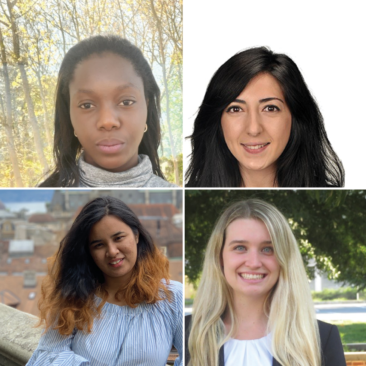Tell Us about Yourself
Ajibuwa Oluwadamilola – Master’s Student, Apprentice
Duygu Dengiz – Master’s Student, Apprentice
Neeha Gogoi – Master’s Student, Apprentice
Sabrina Curtis – M. SC, Mentor
What AEOP program(s) did you participate in?
Material Science and Engineering, Kiel University (Germany)
What Sparked your Interest to Participate in this Field?
Ajibuwa: This field gives me an opportunity to contribute to several different facets of science and technology.
Neeha: I was always a bright student in my school when it came to academics, but in secondary school I really struggled in Mathematics. Ultimately, I opted to pursue chemistry as my major in my bachelor’s program. I worked in a bio-inspired advanced materials lab during my bachelor thesis and did a mini-project on a superhydrophobic coating material. That was the turning point in my life because that’s when I realized that I could make real materials out of nothing, which made me want to study further and work more in this field.
Duygu: When I started studying science, I was amazed by physics and chemistry. Understanding the world in a scientific way, seeing things through a scientific lens, is fascinating. However, I also wanted to be in a practical field instead of in a purely theoretical one, so I decided to study engineering. I believe material science and engineering is a perfect mixture of theory and practice. If necessary, material engineers go to the subatomic levels to solve problems or way above to the macro-level to create a general picture of the problems.
Sabrina: I plan to focus my career on combating climate change effects by innovating renewable energy technologies. I am horrified to see how unsustainable human population growth is causing the environment to rapidly deteriorate around us. This leads to effects including pollution, deforestation, water contamination, animal extinction and climate change. I chose to become a materials scientist because I want to have a broader, interdisciplinary knowledge to make a positive impact on the world by solving some of these issues.
Did you Have a Mentor or Someone who Helped Inspire you to Become who you are Today?
Sabrina: Through my various internships during my undergraduate studies, I was blessed to be exposed to many fantastic doctoral students, post-docs, staff scientists and professors. My female mentors Dr. Gretchen Peters, Professor Kelsey Hatzell, Dr. Beth Tennyson and Professor Marina Leite showed me nothing but support and encouragement both inside the lab and in the classroom. Being a woman in a male dominated field can be quite intimidating, but having female mentors was very motivating for me. Before meeting these women, graduate school never was in the cards for me because I never felt like I was good enough. These inspiring women gave me the confidence I needed to eliminate doubt in myself and in my abilities, ultimately putting me on the path to graduate school.
What Drives your Thirst for Knowledge and is it Ever Quenched?
Ajibuwa: The goal of being a top researcher drives my thirst for knowledge and has never been quenched. Being able to learn something new and being exposed to real life challenges in the field makes the journey more interesting and exciting.
Duygu: I am humbled by the amount of knowledge a person can gain over the course of their life. Knowledge in and of itself is in constant growth. Sometimes learning and understanding something is frustrating, but the eureka moment when everything makes sense is so satisfying. This motivates and pushes me forward when I feel demoralized. You have to get used to failure, no great scientific achievement has ever happened overnight.
What Sage Advice Would you Give to a Student Just Beginning to Consider a Career in STEM?
Ajibuwa: My advice is for the student to discover if that career path is their passion. They should follow the path and grab any opportunity to gain knowledge, so they’ll be able to achieve their goals and contribute to the field.
Neeha: To have patience and be optimistic. Doing science and research are not for weak hearts. It really tests your patience and sense of judgement. It often takes several tries to achieve one goal. So never give up and try to your best.
Duygu: The most important advice I have is to enjoy what you do as a scientist regardless of the research area you are in. If you enjoy it, the hard work will never feel like a burden.
Sabrina: Scientists are not afraid to challenge conventional methods; therefore, we need people who have big ideas and want to help solve some of the world’s most challenging and pressing problems. Don’t be discouraged! Do your research to figure which part of STEM you can make the biggest impact in.
Download Print Version
Ajibuwa Oluwadamilola, Duygu Dengiz, Neeha Gogoi & Sabrina Curtis.

